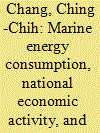| Srl | Item |
| 1 |
ID:
107502


|
|
|
|
|
| Publication |
2011.
|
| Summary/Abstract |
This study examines the causal relationships among energy consumption, economic growth and carbon dioxide emissions in twenty countries from Latin America and the Caribbean region. The methodology includes the use of Phillips and Perron (PP) tests, a cointegration model with vector error correction modeling (VECM) and vector autoregression (VAR) with Granger causality. The study concludes that of the twenty countries analyzed, only in four of them will it be possible to implement energy conservation polices without affecting their economic growth, four others are not able to consider an energy conservation policy with economic growth, and the other twelve should focus on their economic growth before adopting any conservation policies. Energy efficiency was found in this region, especially in the countries which have both cointegration and short-term equilibrium.
|
|
|
|
|
|
|
|
|
|
|
|
|
|
|
|
| 2 |
ID:
162268


|
|
|
|
|
| Summary/Abstract |
The main concept of this paper is derived from the Government of Taiwan's Greenhouse Gas Reduction and Management Act (GGRMA), which mandates that greenhouse gas emissions in 2050 should be reduced to half of the rate of greenhouse gas emissions in 2005. To reach this carbon emission goal by 2050, this paper examines three potential policy options (each accompanied with four illustrative scenarios). The results show that: (1) it is impossible to reach the goals of the GGRMA solely through the use of carbon allowance allocations and the use of alternative fuels if the use of vehicles is allowed to grow. (2) By keeping the increase in the use of vehicles to zero, by encouraging a use of PHEVs, and by implementing a carbon allowance allocation, it will be possible to reach the government's 2050 carbon emissions goals. (3) If the use of vehicles can actually be reduced, it will be possible to achieve carbon emissions which are lower than the 2050 targets by 1.30–5.18%. The use of alternative fuels proves to be a reliable way to decrease carbon emission. Carbon emissions could also be lowered by encouraging the use of public transportation.
|
|
|
|
|
|
|
|
|
|
|
|
|
|
|
|
| 3 |
ID:
111390


|
|
|
|
|
| Publication |
2012.
|
| Summary/Abstract |
The causal relationships among marine energy consumption, greenhouse gas emissions from international shipping, and economic growth for Kyoto Protocol Annex I countries for the period of 1990 to 2006 are discussed. The real gross domestic product is used as a proxy for economic activity. The United States is also discussed because it was the main global polluter before 2006. The co-integration methodology and an error-correction model are used to examine the causal relationships. The empirical results show that marine energy consumption and GDP are the main factors of increased GHG emissions in the short-run, and that economic activity significantly increased emissions in the long-run. Emissions from shipping are more closely related to marine energy consumption than to economic activity. Hence, policies for mitigating greenhouse gas emissions from marine shipping need to focus on greater energy efficiency in the design of ship engines and hulls.
|
|
|
|
|
|
|
|
|
|
|
|
|
|
|
|